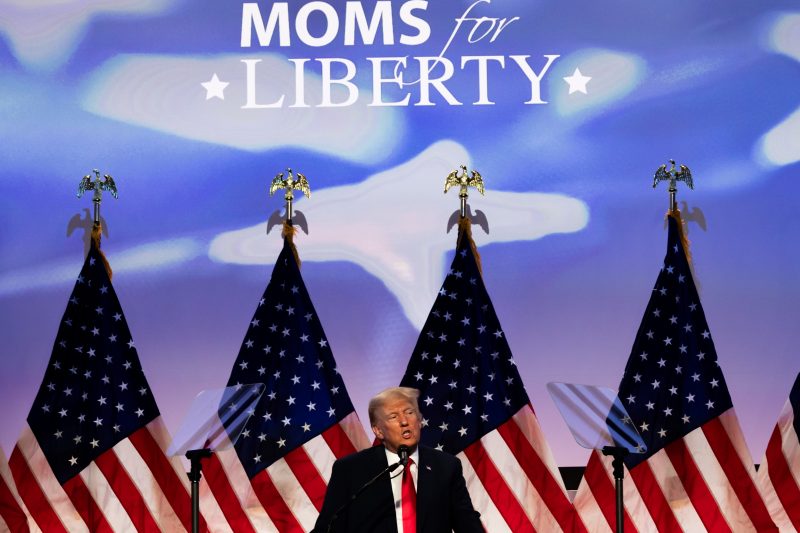The past few months have not done much to dissuade Elon Musk from the idea that he knows more about everything than everyone. So those who managed to use the crumbling Twitter ecosystem this weekend would probably not have been surprised to see the jack of all trades weigh in on who he thinks should help guide civilization forward.
“The childless,” he wrote in response to a tweet, “have little stake in the future.”
Another user, one with a check mark next to their username, picked up the idea.
“Democracy is probably unworkable long term without limiting suffrage to parents,” they wrote, earning a “Yup” from Musk.
Outside of the context of Musk’s original tweet, this idea that parents deserve an elevated role in the conversation appears to be an increasingly common one. Over the weekend, the emergent group Moms for Liberty held a conference that earned appearances from a number of Republican contenders for the presidency. The group’s mission runs in parallel to Musk’s: that parents should be the ultimate decision-makers.
But it’s worth considering the context for Musk’s actual tweet. He was responding to a thread in which a prominent anti-Muslim activist was suggesting that France was being subjugated to Islamic rule, as purportedly manifested in recent protests. Another user replied that this subjugation was “[t]hanks to the white female vote,” which prompted Musk to declare that those without children have no stake in the future.
Scratch the surface, and things quickly get ugly.
The activist opining about the demise of France is named Amy Mekelburg. Her role in amplifying anti-Muslim rhetoric has been explored by the Southern Poverty Law Center (SPLC) as it documents and monitors hate speech.
But, then, Moms for Liberty has similarly triggered warnings from the SPLC.
“Moms for Liberty and its nationwide chapters combat what they consider the ‘woke indoctrination’ of children by advocating for book bans in school libraries and endorsing candidates for public office that align with the group’s views,” the SPLC explains. “They also use their multiple social media platforms to target teachers and school officials, advocate for the abolition of the Department of Education, advance a conspiracy propaganda, and spread hateful imagery and rhetoric against the LGBTQ community.”
The group’s genesis overlaps with two recent trends. The first was school closures during the pandemic, a move intended to limit the spread of the coronavirus that quickly became intertwined with partisan politics, just like everything else pandemic-related. The other was the backlash against including instruction about race in school curriculums, the “critical race theory” scare amplified by Fox News. That proved to be an effective organizing vehicle, particularly for parents on the right. In short order, LGBTQ issues were folded into the mix in an effort to use social issues as a political wedge.
This movement depends on an exaggerated sense of innocence. These are just parents worried about their kids! They simply want schools to focus on fundamentals, like reading and arithmetic, instead of teaching about systemic racism or oral sex! Why, even the government is trying to oppress them, what with its calling upset parents “domestic terrorists”!
That’s not what the government did, of course. Hearing concerns about increasingly aggressive threats to school officials and administrators, the Justice Department released a statement insisting it would crack down on threats of violence. The other assertions in the paragraph above are similarly misleading. There was no widespread effort to teach critical race theory to kids in schools, though there was an effort to use that term to broadly attack discussions of race. The criticisms of discussion of same-sex relationships are similarly overblown and often dependent upon the argument that there’s something inherently sexual about people of the same gender being in love.
Most important, though, it is not the case that parents are inherently politically conservative. When Sen. J.D. Vance (R-Ohio) suggested letting parents cast votes for their kids — a different flavor of this same discussion — The Washington Post looked at the effect that might have. But we can summarize the divides here more succinctly, using data from the biennial General Social Survey.
More than half of those without any kids identify as Democrats or Democratic-leaning independents. (From here on, I’ll just lump independents who lean toward a party in with the party itself.) More than a third of that group identify as liberal Democrats. Among those with children who are all under the age of 18, just under half identify as Democrats, nearly double the percentage that identifies as Republicans.
This makes sense! Parents tend to be younger, thanks to biology and social expectations (though they’re older than they used to be). If we separate out parents who have at least one adult child — parents who are definitionally older — the politics shift.
Musk’s comment about “the childless” serves as a counterpoint to those with children, a group that includes a lot of people in their 60s and 70s who have kids in their 40s and 50s. One suspects that his concern is not that those parents are underrepresented or that they necessarily are tasked with guiding the future for their middle-aged kids. He’s referring to people like himself: those with young kids who feel as though they are unusually prominent as stewards of the next generation.
Setting aside the solipsism of that idea — there are, of course, lots of people who don’t have kids or can’t have kids but are still deeply interested in ensuring the world’s future — it is not an uncommon one. Parents (like myself) have lots of advice and lots of thoughts about how to raise kids and what kids should learn and so on. Historically, this permeated families and social relationships. Schools and other institutions, meanwhile, hired professional educators and administrators who focused on understanding how to educate a diverse range of children generally with an eye toward creating well-rounded citizens.
But we now live in an era where parents become celebrities by opining on TikTok and where millions of people have decided that their online research is equivalent to years of education. It’s an era that’s deeply exploitable: Convince people they’re smarter for adopting counterintuitive or selfish positions, and they’ll do so. Some might pay $44 billion for an unprofitable social media company!
Again, it’s easy to see the appeal of Moms for Liberty. Carrying the imprimatur of parents is politically valuable. (On Monday, after Florida Gov. Ron DeSantis (R) appeared at the group’s gathering, his campaign announced its “Mamas for DeSantis” initiative.) But most parents aren’t hard-right culture warriors seeking to rid middle-school libraries of books that broach same-sex intimacy. Let only parents with young children vote, and they’re not going to vote the way Elon Musk wants.








